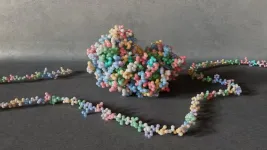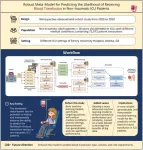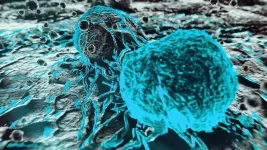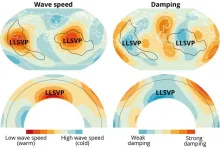(Press-News.org) MINNEAPOLIS/ST. PAUL (1/22/2025) — A research team from the University of Minnesota Medical School recently received a three-year, $1.2 million grant from the National Institutes of Health to study the use of transcranial magnetic stimulation (TMS) as a treatment for youth with Tourette syndrome and other tic disorders.
These conditions affect one in every 50 children and are characterized by involuntary movements or sounds called “tics.” Tics are often painful, distressing and interfere with daily life activities. In some cases, tics can be quite disabling.
The research team recently completed the first phase of this clinical trial in which they tested the use of TMS in addition to Comprehensive Behavioral Intervention for Tics (CBIT) as a treatment for children with Tourette syndrome. They found that this new treatment — known as CBIT+TMS — was safe, tolerable and improved circuits in the brain involved in tics.
“This work was really motivated by our clinical work and conversations with the Tourette community, which highlighted the limitations of our current treatments. Many treatments were developed when we knew much less about the brain,” said Christine Conelea, PhD, an associate professor at the U of M Medical School and pediatric psychologist with M Health Fairview. “Our results make us hopeful about the potential for CBIT+TMS to be a future treatment option that addresses these gaps.”
This new grant will be used for the second phase of the clinical trial, which will test CBIT+TMS to better understand how the treatment changes both the brain and symptoms. If successful, this work has the potential to lead to a new treatment option for people with Tourette syndrome in the future.
The trial will begin recruiting participants this spring.
###
About the University of Minnesota Medical School
The University of Minnesota Medical School is at the forefront of learning and discovery, transforming medical care and educating the next generation of physicians. Our graduates and faculty produce high-impact biomedical research and advance the practice of medicine. We acknowledge that the U of M Medical School is located on traditional, ancestral and contemporary lands of the Dakota and the Ojibwe, and scores of other Indigenous people, and we affirm our commitment to tribal communities and their sovereignty as we seek to improve and strengthen our relations with tribal nations. For more information about the U of M Medical School, please visit med.umn.edu.
END
U of M Medical School research team receives $1.2M grant to study Tourette syndrome treatment
2025-01-22
ELSE PRESS RELEASES FROM THIS DATE:
In the hunt for new and better enzymes, AI steps to the fore
2025-01-22
Enzymes are crucial to life. They are nature’s little catalysts. In the gut, they help us digest food. They can enhance perfumes or get laundry cleaner with less energy. Enzymes also make potent drugs to treat disease. Scientists naturally are eager to create new enzymes. They imagine them doing everything from drawing greenhouse gases out of the skies to degrading harmful toxins in the environment.
That age-old quest for new enzymes just got a whole lot easier. A team of bioengineers and synthetic biologists has developed a computational workflow that can design thousands of new enzymes, predict how they will behave in the real world, and test their performance ...
Females have a 31% higher associated risk of developing long COVID, UT Health San Antonio-led RECOVER study shows
2025-01-22
SAN ANTONIO, Jan. 22, 2025 – Females have a 31% higher associated risk of developing long COVID, with women aged 40 to 55 years having the highest propensity, according to a study led by The University of Texas Health Science Center at San Antonio (UT Health San Antonio) funded by the National Institutes of Health.
The findings are part of a nationwide initiative launched by NIH, called Researching COVID to Enhance Recovery, or RECOVER, to understand the long-term health effects of COVID-19.
The latest ...
Final synthetic yeast chromosome unlocks new era in biotechnology
2025-01-22
Macquarie University researchers have worked with an international team of scientists to achieve a major milestone in synthetic biology by completing the creation of the final chromosome in the world's first synthetic yeast genome.
This achievement represents the completion of the global Sc2.0 project to create the world's first synthetic eukaryotic genome from Saccharomyces cerevisiae (baker's yeast) and a new-to-nature tRNA neochromosome.
Using cutting-edge genome-editing techniques, including the CRISPR D-BUGS protocol, the team identified and corrected genetic errors that impacted yeast growth. These changes restored the strain’s ability to grow on glycerol, ...
AI-powered prediction model enhances blood transfusion decision-making in ICU patients
2025-01-22
Researchers at Emory University have developed a groundbreaking artificial intelligence (AI) model capable of accurately predicting the likelihood of blood transfusion in non-traumatic intensive care unit (ICU) patients. Published in Health Data Science, the study addresses longstanding challenges in predicting transfusion needs across diverse patient groups with varying medical conditions.
Blood transfusions are critical in managing anemia and coagulopathy in ICU settings, yet current clinical decision support systems often ...
MD Anderson Research Highlights for January 22, 2025
2025-01-22
HOUSTON ― The University of Texas MD Anderson Cancer Center’s Research Highlights showcases the latest breakthroughs in cancer care, research and prevention. These advances are made possible through seamless collaboration between MD Anderson’s world-leading clinicians and scientists, bringing discoveries from the lab to the clinic and back.
Novel allogeneic NK cell therapy from induced pluripotent stem cells shows encouraging efficacy in relapsed or refractory B-cell lymphoma patients
Patients ...
Scholastica announces integration with Crossmark by Crossref to expand its research integrity support
2025-01-22
CHICAGO, IL (January 22, 2025) — Scholastica, a leading software solutions provider for academic journals, has released a new integration with Crossmark by Crossref, the industry standard mechanism for reporting updates to published research.
The Crossmark integration is now available to journals subscribed to the Scholastica Open Access Publishing Platform that are published by a Crossref member organization participating in the Crossmark service.
“Clearly communicating article updates and retractions is critical to maintaining the integrity of the scholarly record, and with this ...
Could brain aging be mom’s fault? The X chromosome factor
2025-01-22
Women are born with two X chromosomes and inherit one from each parent. But in every cell of their body, just one X chromosome is needed – so the other is randomly inactivated. Some cells use only a maternal X chromosome; others rely only on the paternal X.
Now, UC San Francisco researchers have found that when the brain cells of female mice express only a maternal X chromosome, their memory and cognitive skills deteriorate faster than female mice that express both maternal and paternal X chromosomes.
The discovery, which appears Jan. 22 in Nature, could explain the variation in brain aging between the sexes, since males inherit only a maternal X, as ...
Subterranean ‘islands’: strongholds in a potentially less turbulent world
2025-01-22
Deeply hidden in Earth’s mantle there are two huge ‘islands’ with the size of a continent. New research from Utrecht University shows that these regions are not only hotter than the surrounding graveyard of cold sunken tectonic plates, but also that they must be ancient: at least half a billion years old, perhaps even older. These observations contradict the idea of a well-mixed and fast flowing Earth’s mantle, a theory that is becoming more and more questioned. “There is less flow in Earth’s ...
Complete recombination map of the human-genome, a major step in genetics
2025-01-22
Complete recombination map of the human genome, a major step in genetics
Scientists at deCODE genetics/Amgen have constructed a complete map of how human DNA is mixed as it is passed down during reproduction. The map marks a major step in the understanding of genetic diversity and its impact on health and fertility. It continues 25 years of research at deCODE genetics into how new diversity is generated in the human genome, and its relationship to health and disease.
The new map, appearing today in the online edition of Nature, is the first to incorporate shorter-scale shuffling, ...
Fighting experience plays key role in brain chemical’s control of male aggression
2025-01-22
Like humans, mice will compete over territory and mates, and show increased confidence in their fighting skills the more they win. At first, a brain chemical called dopamine is essential for young males to master this behavior. But as they gain experience, the chemical grows less important in promoting aggression, a new study shows.
Dopamine has been linked to male aggression for decades. How past experiences might influence this relationship, however, had until now been unclear.
In experiments in rodents, a team led by researchers at NYU Langone Health boosted activity in dopamine-releasing cells in a part of the brain called the ventral tegmental area. The findings revealed that in ...




